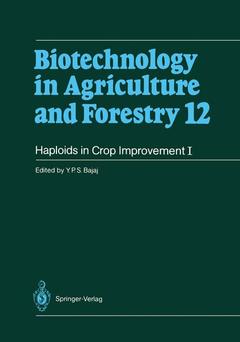Haploids in Crop Improvement I, 1990 From Fundamentals to Quantum Computing Biotechnology in Agriculture and Forestry Series, Vol. 12
Langue : Anglais
Auteur : Bajaj Y. P. S.

Haploid plants have the gametophytic number of chromosomes. They are of great importance, especially in studies on the induction of muta tions and also for the production of homozygous plants, they are needed in large numbers. The conventional methods employed by plant breeders for their production are cumbersome, time-consuming, laborious and rather inefficient. Sometimes it may take years to produce a pure line. However, with the introduction of in vitro techniques, especially anther culture for the induction of androgenesis, it has become increasingly evi dent that these methods considerably accelerate the production of haploids for plant breeding programs. During the last decade, in vitro-produced haploids have been incor porated into breeding programs of many agricultural crops, and positive results have been obtained especially with rice, wheat, potato, barley, maize, asparagus, sunflower, brassica, tobacco, etc. Among these, rice and wheat are the best examples in which a number of improved varieties have been released. In wheat, the breeding cycle can be shortened by three or four generations when the pollen haploid breeding method is used instead of conventional cross-breeding. The release of the wheat varieties Jinghua 1 and Florin is a typical example of what can be achieved with other crops. Taking these developments into considera tion, the present volume, Haploids in Crop Improvement I, was compil ed.
Induction of Haploids, Pollen Embryogenesis, Ultrastructure, and Genetic Stability.- I.1 In Vitro Production of Haploids and Their Use in Cell Genetics and Plant Breeding.- I.2 Environmental and Genetical Aspects of Pollen Embryogenesis.- I.3 Ultrastructure Of Pollen Embryogenesis.- I.4 Genetic Stability in Haploid Cell Cultures.- Cereals.- II.1 Wheat (Triticum aestivum): In Vitro Production and Utilization of Doubled Haploids.- II.2 Barley (Hordeum vulgare L.): Anther Culture and the Production of Haploids.- 7 II.3 Maize (Zea mays L.): In Vitro Production of Haploids.- II.4 Rice (Oryza sativa L.): Guan 18 - an Improved Variety Through Anther Culture.- Trees.- 9 III.1 Rubber (Hevea brasiliensis Muell. Arg.): In Vitro Production of Haploids.- III.2 Poplars (Populus spp.): In Vitro Production of Haploids.- III.3 Apple (Malus domestica Borkh.): In Vitro lnduction of Androgenesis.- III.4 Litchi (Litchi chinensis Sonn.): In Vitro Production of Haploid Plants.- Medicinal Plants.- IV. 1 Digitalis spp.: In Vitro Production of Haploids.- IV.2 Hyoscyamus spp.: Anther Culture Studies.- Vegetables, Fruits, Miscellaneous.- V.1 Arabidopsis thaliana (L.): In Vitro Production of Haploids.- V.2 Asparagus Anther Culture and Field Trials of Dihaploids and F1 Hybrids.- V.3 Sugarbeet (Beta vulgari L.): In Vitro Induction of Haploids.- V.4 Cabbage (Brassica oleracea var. capitala) and Brussels Sprout (Brassica oleracea var. gemmifera): In Vitro Production of Haploids.- V.5 Pepper (Capsicum spp.): In Vitro Induction of Haploids.- V.6 Carrot (Daucus carota L.): In Vitro Production of Haploids and Field Trials.- V.7 Strawberry (Fragaria × ananassa Duch.): In Vitro Production of Haploids.- V.8 Gerbera jamesonii H. Bolus ex Hook: In Vitro Production of Haploids.- V.9 Sunflower (Helianthus annuusL.): In Vitro Production of Haploids.- V.l0 Tomato (Lycopersicon esculentum L.): Anther Culture and Induction of Androgenesis.- V.11 Alfalfa (Medicago spp.): In Vitro Production of Haploids.- V.12 Winged Bean (Psophocarpus tetragonolobus L. TPt6): Culture of Excised Anthers and Unfertilized Ovules.- V.13 Sugarcane (Saccharum spp.): Anther Culture Studies.- V.14 Wild Tomato (Solanum carolinense L.): Anther Culture and the Induction of Haploids.- V.15 Wild Potato (Solanum chacoense Bitt.): In Vitro Production of Haploids.- Solanum phureja: Anther Cultureand the Induction of Haploids in a Cultivated Diploid Potato Species.
Date de parution : 02-2012
Ouvrage de 549 p.
17x24.2 cm
Disponible chez l'éditeur (délai d'approvisionnement : 15 jours).
Prix indicatif 231,04 €
Ajouter au panierThèmes de Haploids in Crop Improvement I :
© 2024 LAVOISIER S.A.S.



